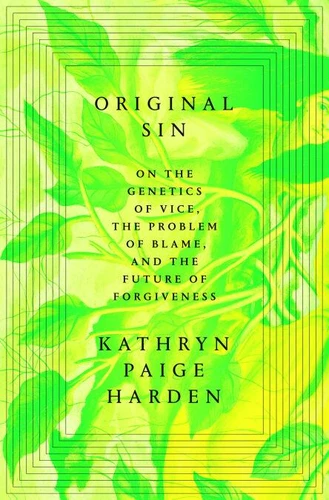Original Sin. On the Genetics of Vice, the Problem of Blame, and the Future of Forgiveness
Par :Formats :
Actuellement indisponible
Cet article est actuellement indisponible, il ne peut pas être commandé sur notre site pour le moment. Nous vous invitons à vous inscrire à l'alerte disponibilité, vous recevrez un e-mail dès que cet ouvrage sera à nouveau disponible.
Disponible dans votre compte client Decitre ou Furet du Nord dès validation de votre commande. Le format ePub protégé est :
- Compatible avec une lecture sur My Vivlio (smartphone, tablette, ordinateur)
- Compatible avec une lecture sur liseuses Vivlio
- Pour les liseuses autres que Vivlio, vous devez utiliser le logiciel Adobe Digital Edition. Non compatible avec la lecture sur les liseuses Kindle, Remarkable et Sony
- Non compatible avec un achat hors France métropolitaine
 , qui est-ce ?
, qui est-ce ?Notre partenaire de plateforme de lecture numérique où vous retrouverez l'ensemble de vos ebooks gratuitement
Pour en savoir plus sur nos ebooks, consultez notre aide en ligne ici
- Nombre de pages320
- FormatePub
- ISBN978-0-593-44763-5
- EAN9780593447635
- Date de parution03/03/2026
- Protection num.Adobe DRM
- Infos supplémentairesepub
- ÉditeurRandom House
Résumé
An intellectually daring and deeply intimate exploration of how genetics complicates our ideas about blame, punishment and moral responsibility-from acclaimed psychologist and author of The Genetic Lottery, Kathryn Paige Harden. As one of the world's leading scientists examining how our DNA shapes differences in temperament, temptation and behaviour, Kathryn Paige Harden has seen firsthand how we-in public and in our most private relationships-continue to struggle with the ancient tensions between nature and nurture, freedom and constraint, the desire to punish and the longing to forgive.
In Original Sin, she weaves together insights from her own experience as a daughter, mother, wife, and scientist with cutting-edge research in genetics and psychology to grapple with some of the most important questions in modern life: How do we take responsibility for the people we become, knowing how we are shaped by both biology and experience? How should we respond when people hurt each other-or themselves? And has science made guilt obsolete?Navigating the psychological and biological terrain of addiction, antisocial behaviour and violence, Harden confronts the disorienting ways science unsettles our understanding of wrongdoing and choice.
In doing so she asks us not to absolve, but to reckon differently with notions of fairness and blame. A revelatory inquiry into the uneasy space where human behaviour meets inherited biology, Original Sin challenges us to imagine a more humane vision of accountability-for ourselves and for one another.
In Original Sin, she weaves together insights from her own experience as a daughter, mother, wife, and scientist with cutting-edge research in genetics and psychology to grapple with some of the most important questions in modern life: How do we take responsibility for the people we become, knowing how we are shaped by both biology and experience? How should we respond when people hurt each other-or themselves? And has science made guilt obsolete?Navigating the psychological and biological terrain of addiction, antisocial behaviour and violence, Harden confronts the disorienting ways science unsettles our understanding of wrongdoing and choice.
In doing so she asks us not to absolve, but to reckon differently with notions of fairness and blame. A revelatory inquiry into the uneasy space where human behaviour meets inherited biology, Original Sin challenges us to imagine a more humane vision of accountability-for ourselves and for one another.
An intellectually daring and deeply intimate exploration of how genetics complicates our ideas about blame, punishment and moral responsibility-from acclaimed psychologist and author of The Genetic Lottery, Kathryn Paige Harden. As one of the world's leading scientists examining how our DNA shapes differences in temperament, temptation and behaviour, Kathryn Paige Harden has seen firsthand how we-in public and in our most private relationships-continue to struggle with the ancient tensions between nature and nurture, freedom and constraint, the desire to punish and the longing to forgive.
In Original Sin, she weaves together insights from her own experience as a daughter, mother, wife, and scientist with cutting-edge research in genetics and psychology to grapple with some of the most important questions in modern life: How do we take responsibility for the people we become, knowing how we are shaped by both biology and experience? How should we respond when people hurt each other-or themselves? And has science made guilt obsolete?Navigating the psychological and biological terrain of addiction, antisocial behaviour and violence, Harden confronts the disorienting ways science unsettles our understanding of wrongdoing and choice.
In doing so she asks us not to absolve, but to reckon differently with notions of fairness and blame. A revelatory inquiry into the uneasy space where human behaviour meets inherited biology, Original Sin challenges us to imagine a more humane vision of accountability-for ourselves and for one another.
In Original Sin, she weaves together insights from her own experience as a daughter, mother, wife, and scientist with cutting-edge research in genetics and psychology to grapple with some of the most important questions in modern life: How do we take responsibility for the people we become, knowing how we are shaped by both biology and experience? How should we respond when people hurt each other-or themselves? And has science made guilt obsolete?Navigating the psychological and biological terrain of addiction, antisocial behaviour and violence, Harden confronts the disorienting ways science unsettles our understanding of wrongdoing and choice.
In doing so she asks us not to absolve, but to reckon differently with notions of fairness and blame. A revelatory inquiry into the uneasy space where human behaviour meets inherited biology, Original Sin challenges us to imagine a more humane vision of accountability-for ourselves and for one another.





